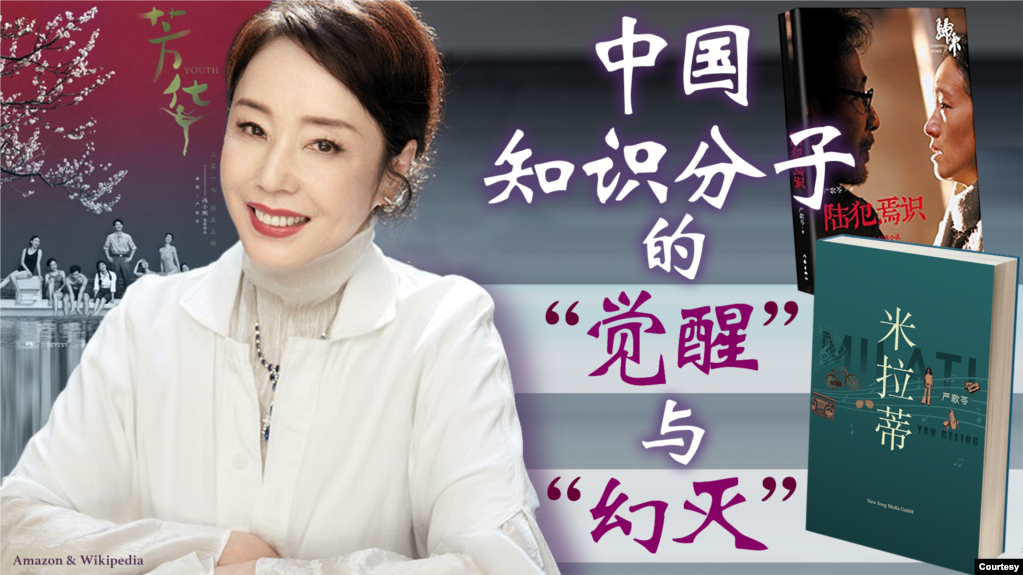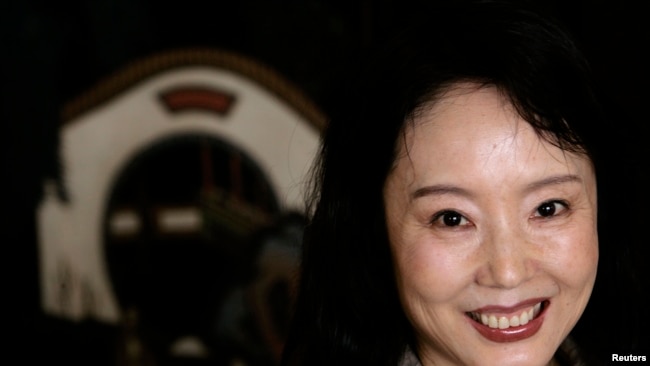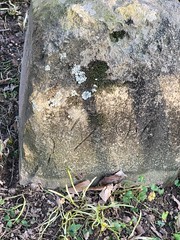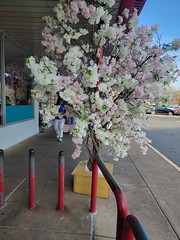Interview with Yan Geling: The Awakening and Disillusionment of Chinese Intellectuals
September 30, 2023 By Fan Dongning
Yan Geling, a Chinese-American writer and screenwriter, and her new book Miradi
[Washington, DC] — “In the spring of 1969, due to the invention of a new drug, a group of patients with sleeping disorders woke up, but soon most of them fell asleep again. This awakening was only for the final disillusionment. After experiencing the last convulsion of the great awakening in 1989, Chinese intellectuals fell back to sleep.“

Chinese-American writer and screenwriter Geling Yan [Yan Geling 严歌苓] pointed out this passage in her first completely uncensored banned book, Miradi.《米拉蒂》
Yan Geling, who has collaborated with renowned directors such as Zhang Yimou, Feng Xiaogang, and Ang Lee, and has authored bestsellers like “The Criminal Lu Yanshi,” “Youth,” and “Little Fish,” 《陆犯焉识》、《芳华》、《少女小渔》等畅销书 and has won numerous awards worldwide, has faced comprehensive censorship by the Chinese Communist authorities for her criticism of the concealment of the epidemic, support for the Iron Chained Women, and outspoken expression of anger to those in power, even to the point where her name temporarily became a sensitive word on the Chinese internet.

Photo: Chinese-American writer and screenwriter Yan Geling Photo: Chinese-American writer and screenwriter Yan Geling
Miradi – A Eulogy to the 1980s
Yan Geling, who resides in Germany, has decided to establish her own publishing house. Her first long novel created in a completely free environment, Miradi, covers events from the Cultural Revolution, armed conflicts, the journey of educated youth to the countryside, returning to the city, re-education through labor, and the crackdown, all the way to the Tiananmen Square massacre in 1989. It focuses on the “awakening” and “disillusionment” of Chinese intellectuals in the 1980s. Yan Geling, in an interview with Voice of America‘s “In-Depth Perspective,” stated that Miradi is a eulogy to the 1980s. She said, “What our generation of intellectuals is experiencing now is what our elders went through during the Cultural Revolution. The fate of Chinese intellectuals keeps repeating, and the underlying reasons are worth pondering.“
Yan Geling reconstructed and fictionalized the personal experiences of her father’s generation in the 1980s, along with her own observations and experiences from that decade, serving as the prototype for the story of Miradi. She tells the story of love, the longing for freedom, and the struggles in artistic creation among two generations of intellectuals after the catastrophe of the Cultural Revolution. Yan Geling explained that the protagonist, Miradi, like herself at the time, transitioned from being a dancer in an art troupe to a young writer. In the book, Miradi serves as a pair of eyes and a clue, connecting all the possible stories of the 1980s. These past events in China may seem absurd, but they are portrayed as surrealistic paintings that are incredibly gripping. Poet Yang Lian commented on Miradi: “Understanding Yan Geling’s book is understanding contemporary China.“
Approaching History through Literature
When asked about the greatest significance of writing Miradi, Yan Geling stated that she hopes to write the history of the Chinese nation through literary art. She said, “Some people, for certain undisclosed purposes, want our nation to forget historical events like the Cultural Revolution and June 4th, but if we forget these events, our Chinese nation will cease to be a Chinese nation. I’ve always wondered why Chinese people have such a good forgetfulness? Why is our memory so poor? All the suffering we’ve experienced, if not remembered and reflected upon, we will repeat that suffering, and in fact, it has been proven. Du Mu wrote in ‘The Palace of Eternal Youth’ 杜牧写的《阿房宫赋》 : ‘The people of Qin did not have time to mourn for themselves, and later generations mourned for them, later generations mourned for them without reflecting on it.’ This means that you are forever unable to mourn for yourself, too busy to remember these things. So, each generation is ‘unable to mourn for themselves,’ and they let the next generation ‘mourn for their misfortunes.’ The repetition of this tragedy is very sad.“
Yan Geling believes that as creators, they should use their works to prompt people to reflect on and ponder history. She said, “If even we writers lack this kind of initiative, this kind of self-awareness to write some history for our nation, then we won’t gain any insight from the difficulties and suffering we’ve experienced. On the contrary, because the artistic imagery of literature can be very vivid, everyone might be able to recognize a little bit about themselves, their own experiences, and their own tragedies through this artistic imagery. A history textbook may be too rigid and too direct, but as a novel, as a work of literature, it can easily stimulate people to reflect and think. It explains why all these characters in history had their experiences, what exactly happened? We cannot always avoid seeking the reasons behind it.”
Using the Absurd to Write About Human Suffering
Yan Geling wrote in Miradi, “A nation that lacks an understanding of absurdity and irony is a nation with weak speculative ability and insufficient self-confidence.” Yan Geling told Voice of America that the suffering and absurdity that Chinese people have experienced in the past three years due to the pandemic are surreal and fantastical. “I feel like I can no longer express it with anger and sorrow because what is happening in China today is beyond the comprehension of ordinary people and common sense. You see one leader disappearing today, and tomorrow someone else disappears. How can this be the experience of a normal society or a normal country?“
Yan Geling said, “As I grow older, I dislike complaining seriously or writing too heavily because I’ve seen too much. I believe that a powerful nation is one that can mock itself. As a member of this nation, I can mock myself and mock my own nation. I believe that this is a display of confidence and strength. If I keep crying and complaining about the suffering of the Chinese people, I think it’s not enough because now the problems have gone beyond love and hate, beyond anger, and have become a kind of absurdity, especially in these past three years. All the suffering endured by the Chinese people makes me feel a sense of absurdity. If I continue to write about our nation in the same way after these three years, I may not have grown. I believe I have grown, and this kind of growth comes from the catastrophe of the pandemic that the whole world and the Chinese people have experienced together. It’s a kind of growth that makes me realize this absurdity.”
Like The Topsy-Turvy World of Beauty and Ugliness in the Tale “The Raksha Country and the Sea Market” in the Face of the Absurd
Yan Geling believes that the absurdity present in today’s Chinese society is a major reason why Dao Lang’s hit pop song “Upside-Down Beauty of Raksha Country“《罗刹海市》 has resonated so profoundly. Dao Lang uses satirical lyrics to sing and shout about the absurd reality in Chinese society, where ugliness is celebrated as beauty. Yan Geling provides two examples to illustrate this “upside-down beauty” in Chinese society.
In one instance at a book signing event, a young woman approached Yan Geling and asked her to inscribe the words “Rising Step by Step” in addition to her signature. Yan Geling inquired about the reason, and the woman casually responded that she aspired to “rise step by step” as a government official. Yan Geling returned the book and told her to “serve the people well.”
In another example, a young girl, unable to afford studying abroad, cried and asked her father why he didn’t become corrupt to facilitate her education. Yan Geling is deeply troubled by this stark display of “upside-down beauty” in Chinese society. She questions whether virtues can be eaten or spent and emphasizes that if virtues cannot serve practical purposes such as consumption or tangible benefits, they are considered worthless and discarded. Yan Geling asks, “If every Chinese person treats virtues as garbage, what kind of nation will we become?”
Wherever You Can Speak the Truth is China
Yan Geling openly admits that she once battled depression. Her doctor warned her that taking medication might result in losing her creative abilities, but she prioritized her mental well-being. Like when she left China after the 1989 Tiananmen Square incident, her primary concern was freedom and being able to speak the truth.
Yan Geling also quotes a statement made by the father of the main character in her book Miradi after leaving China: “Wherever true art exists, there is China.” This echoes the words of the late historian Yu Ying-shih: “Where I am, there is China.” Yan Geling firmly believes in the concept of a cultural homeland, emphasizing that even when physically distant from China, she can still share Chinese stories with readers worldwide. She asserts, “You can take me out of China, but you can’t take China out of me,” reiterating this sentiment in both English and Chinese during the interview.
The Backbone of Intellectuals
Despite being in a foreign land and the potential difficulty of returning to China in the short term, Yan Geling expresses her admiration and respect for Chinese intellectuals who continue to speak out courageously, such as Xu Zhiyong, Geng Xiaonan, journalist Gao Yu, and authors Zhang Yihe and Fang Fang. She considers them braver than herself because they face the imminent threat of being silenced, questioned, or detained by the authorities. Yan Geling acknowledges them as true heroes and expresses her desire that other Chinese writers also find the courage to speak their minds, as it would greatly benefit Chinese culture and literature.
Challenging Theater and Film
Yan Geling mentions that her income has gone down, but she has simplified her life. However, In an environment free from the constraints of Chinese censorship, she has found renewed creative potential. In addition to continuing her writing in both Chinese and English, she has founded New Song Media and plans to publish works by other Chinese authors. She also intends to venture into writing for the theater and directing her own films. Yan Geling is willing to provide her scripts for free, and some directors have already expressed interest in collaborating with her, creating a sense of anticipation for her future endeavors.
The text provides insights into Yan Geling’s thoughts on the absurdities of contemporary Chinese society, the importance of speaking the truth, and her plans for the future.
Paper Republic bio of Geling Yan’s husband and translator, retired US Foreign Service Officer Lawrence Walker 王樂仁.
专访严歌苓:中国知识分子的觉醒与幻灭
2023年9月30日 20:42

华盛顿 —
“1969年春天,由于一种新药的发明,使一群患了睡眠症的病人醒了过来,但不久之后他们当中的多数人又睡回去了。这种觉醒仅仅是为了最终的幻灭。中国的知识分子在经历了1989年那场大觉醒的最后痉挛之后,又都睡回去了。”
这是美籍华人作家、电影编剧严歌苓在她第一本完全不受中共审查的禁书《米拉蒂》当中所提到的一段情节。
曾与张艺谋、冯小刚、李安等知名导演合作、着有《陆犯焉识》、《芳华》、《少女小渔》等畅销书,在全球获奖无数的严歌苓,因撰文批评中共当局隐瞒疫情、声援铁链女,直言向当权者表达愤怒,遭到中共审查机制的全面封杀,甚至连她的名字在中国的互联网上都一度变成敏感词。

《米拉蒂》–献给80年代的輓歌
旅居德国的严歌苓决定成立一家自己的出版社,而她第一本在完全自由的环境下创作的长篇小说《米拉蒂》,从文革、武斗、知识青年上山下乡、返城、劳教、严打一直贯穿到1989年的六四天安门大屠杀,以中国80年代知识分子的“觉醒”与“幻灭”为主题。严歌苓在接受美国之音《纵深视角》专访时表示,《米拉蒂》这本书是她献给80年代的一首輓歌。她说:“长辈们过去在文革中所经受的,是我们这一代知识分子现在正在经历的,中国知识分子的命运不断重複,背后的原因值得我们深思。”
严歌苓将她父执辈在80年代的亲身经历予以重组和虚构,再加上她自己在80年代的所见所闻,作为《米拉蒂》这个故事的原型,讲述了文革浩劫之后,两代知识分子的爱情、对自由的渴望、以及对文艺创作的思考与挣扎。严歌苓说主人翁米拉蒂和她当年一样是从一名文工团的舞者转型为年轻作家,她在书中用米拉蒂作为一双眼睛、一条线索,链接了80年代所有可能发生的故事。这些曾经的中国往事虽然看似荒诞,却真实地如同超现实主义的油画,令人惊心动魄。诗人杨炼给《米拉蒂》这本书的评语是:“读懂了严歌苓的这本书,就读懂了当代中国。”
用文学书写历史
被问到创作《米拉蒂》这部小说最大的意义是什麽?严歌苓表示,她希望用文学艺术来为中华民族书写历史。她说:有些人出于一些不可告人的目的,来让我们这个民族去忘记掉像文革、六四这些历史事件,但是如果我们忘记了这些,我们这个中华民族就不成其为中华民族。我一直在想,为什么我们中国人的忘性会这么好?记性会这么差?我们所经历的所有的苦难,如果不被记忆、不被反思的话,我们会重复的经历这样的苦难,事实上也证明是这样的。从杜牧写的《阿房宫赋》就已经说了:“秦人不暇自哀,而后人哀之,后人哀之而不鉴之。” 就是说你永远是不暇自哀,忙的顾不上来记忆这些东西,那么每一代人都是“不暇自哀”,让下一辈的人去“哀其不幸”,这种悲剧的重复,我觉得就是太可悲了。
严歌苓认为,身为一名创作者,应该要用作品去促使人民反思、反省历史。她说:“如果连我们作家也没有这样的一种一种主动性、一种自觉性,来替我们的民族书写一些历史。那我们所经历的困境和苦难就不能获得反省。相反的,正因为文学的艺术形象可以是非常生动的,每个人都可能能通过这个艺术形象,来认识到一点点他自己、他自己的经历,他自己的悲剧的所在。一本历史教科书可能会太生硬、也太直奔主题,但是作为一本小说,作为一本文学作品,就非常容易用它的生动性来使人们反思、使人们思考,就是所有的这些人物他们的经历之所以发生,究竟是为什么发生?我们不能永远不去追其所以然。”
用荒诞书写苦难
严歌苓自己在《米拉蒂》这本书中写道:“一个缺乏对荒诞的认识、缺乏讽刺意识的民族,是思辨能力孱弱和自信力不够的民族。” 严歌苓告诉美国之音,中国人在过去三年疫情下所经历的种种苦难与荒诞,实在是太超现实、太魔幻了!“我觉得我都已经没办法再用愤怒和悲哀来表现,因为当今中国的这些事情已经超过了常人、常理和常识能够理解的范围。你看今天失踪一个领导、明天又谁谁谁不见了,这怎么可能是一个正常的社会、正常的国家所经历的事情呢?”
严歌苓说:“我现在年纪越大,越不喜欢一本正经去控诉、或者是写的太沉重,因为我已经看穿的太多了,我认为一个最有力量的民族是能够经得起自嘲的,我作为民族的一员来自嘲我自己、自嘲我自己的这个民族,我觉得这是一种自信和有力量的表现,如果我永远都是哭哭啼啼的在诉说中国人的苦难的话,我觉得这已经是不够的了,因为现在已经不是爱恨、愤怒就能解决的问题 ,现在已经远远超过了爱恨、愤怒这种原色调的感情,已经变成了就是一种荒诞,特别是这三年的种种种种……中国人所遭受的所有的苦难,让我都感觉到有一种荒诞的意味在里面。我如果经过了这三年还是用原来的那个写法来写我们的这个民族,我觉得就可能是没有成长,我认为我是已经成长了,这样的一种成长,是全世界和中国人一起经历了三年来这场疫情的灾难,是一种倾城、倾国、倾球、倾翻了地球才让我认识到的一种荒诞。”
美丑颠倒的“罗刹海市”
严歌苓认为当今中国社会的这种荒诞,也是最近刀郎的歌曲《罗刹海市》之所以能够引发巨大共鸣的主要原因。因为刀郎也是运用讽刺的歌词,把中国社会“以丑为美”的荒诞现实给唱了出来、吼了出来。严歌苓还举了两个例子来说明当今中国社会的这种“美丑颠倒”。她说有次在签书会上,一个年轻的女子走到她面前请她签书,还希望严歌苓多加上四个字“步步高升”,严歌苓问她为什麽?这位女士理所当然地说,我当了公务员就是要“步步高升”。严歌苓把书还给了这位女士,对她说:“妳好好为人民服务吧!”
严歌苓还举了另外一个例子,是一个女孩因为没有钱出国留学,哭喊着问她父亲为什麽不去当贪官。严歌苓对中国社会这种赤裸裸地“以丑为美”感到心痛,他说从一个这么幼小的心灵、十七八岁,她就觉得宁可做贪官,也不要做一个贫穷的、一个有道德的、一个有浑身具有美德的一个人。
严歌苓在镜头前对所有的中国人提出一个灵魂拷问:“你说美德能吃吗?能花吗?如果不能达到这两个目的,既不能吃、也不能拿来消费,也不能变现成任何一种实际的好处,那么这个美德就等于是一尘不值,就是垃圾。但如果每个中国人都把美德当成垃圾,我们成了这样的一个民族,那你想我们还有好吗?”

哪里能讲真话 哪里就是中国
严歌苓在专访中坦承她曾经一度罹患抑鬱症,医生跟她说,如果服药可能失去她的创作能力,但她说她首先是要做一个正常的人。就像她当年1989年六四事件后离开中国,首先是要能自由,能说真话。
严歌苓也藉由《米拉蒂》女主角的父亲米潇在离开中国之后说的一句话来表达她的心声:“哪里有真艺术、哪里就是中国”,呼应了已故历史学者余英时先生曾经说过的:“我在哪里、哪里就是中国”。
严歌苓说:“这是一种血液的关系,我认为China是一个祖国的概念,你不可能说因为你不在这个国土上,你就这个祖国就不属于我了,所以我非常自信就是 我只要能写中文,能够跟全世界的读者讲我的中国的故事,这个祖国是随着我的走动、可以跟我一块漂流的,因为这个祖国是文化的祖国,我说的更具体点,是曹雪芹的、是汤显祖的、是关汉卿的,是他们给我传承下来的祖国。” “You can take me out of China, but you can’t take China out of me.”(你可以把我逐出中国,但你无法将中国从我心中拿走。)严歌苓在我们和她的专访中,用英文和中文重複强调了这个句子。
知识分子的脊梁
虽然身处异乡,短时间也可能无法再回到国内,严歌苓对哪些仍在中国,跟她一样敢言的知识分子,像是许章润、耿潇男、记者高瑜、还有作家章诒和、方方等人表达敬意。“我觉得他们比我更勇敢,因为我毕竟在人身方面没有这种被边控,被传讯、被羁押的危险,但他们是切身在这种威胁就很临近的地方生活。我觉得他们是真正的勇士,我觉得我是在向他们学习。” 严歌苓说。
被问到在习近平当局变本加厉的言论箝制与思想管控下,在中国的作家们是否还有创作空间?知识分子们是否还有脊梁与担当?还是只能像《米拉蒂》书中所写的那样被迫成为“睡人”?严歌苓说:“我想他们也是非常苦的,要怎么写才能够把自己不那么曲扭、不那么阉割的去把作品发表出来。他们不能够把自己最好的才智、最大的聪明,发挥在怎么写好这些作品,而是要消磨在怎样去写的隐晦、写得圆滑、可以过关,这是很令人难过的。不过另一方面,我觉得装睡也是一种生存方式吧?是一种存活下去、幸存下去的一种方式,我觉得我们没有任何权利去苛责一个想活下去的人,但是我只是希望,如果每一个中国作家都能够有像耿潇男、像高瑜、像方方这样的勇气,说出一句你真心想说的话来,我想这会对我们的中华民族、对我们这个民族的文学有多大的补救。”
挑战舞台剧和电影
严歌苓说现在的收入虽然减少,但生活可以简化,而且在完全不受中共审查、完全自由的环境下,也激发了她更多的创作潜力。她未来除了继续以中、英文写作之外,她和先生成立的“新歌媒体有限公司”(New Song Media)也将为其他的中国作家出版作品,她还打算尝试写舞台剧,并计划拍摄自己的电影,严歌苓说她可以无偿提供剧本,目前也已经有一些导演有意愿合作,请大家期待。
以上是美国之音与严歌苓的专访文字摘要,完整访谈视频请看《纵深视角》专访严歌苓:中国知识分子的觉醒与幻灭。




Pingback: 2011: Excerpt from Geling Yan’s “The Criminal Lu Yanshi” | 高大伟 David Cowhig's Translation Blog